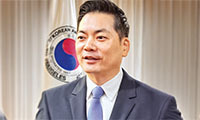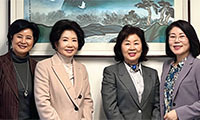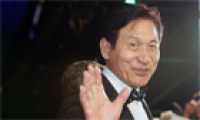Ex-Player Now Trying To Level Soccer Field
▶ MICHEL PLATINI
LONDON - Michel Platini, the outstanding French soccer player of his day, dropped by Jerusalem recently and was received by Israel’s president, Shimon Peres. The two men discussed what role soccer might play toward peace in the Middle East.
The pair had been down this road once before. Three years ago, Mr. Peres and Mr. Platini helped put together a team of Israelis and Palestinians who took on a Spanish team in Seville. This time Mr. Platini visited Jerusalem in his capacity as the head of UEFA, the Union of European Football Associations, and he offered Israel the prospect of hosting international tournaments if enough stadiums could be built.
“I was a leader on the field,”
Mr. Platini, 54, said . “Now, I should be a leader for the game. To me, it is a game - with many, many things attached. It has to remain a game, or nobody will save it.” Mr. Platini is trying, for a second time, to transform soccer. He fought in his younger days for the sport to be an accepted profession in France. He transcended the game, and made his mark as a champion of fair play. And he made his fortune in his father’s homeland, with the Italian club Juventus, whose owner, Gianni Agnelli, the head of Fiat, adored Mr. Platini.
But in his second career, the often excruciating transition that professional sports figures face, Mr. Platini is taking on an even more difficult task.
He is trying to unite under a common set of operating principles the 53 members of UEFA: 27 states inside the European Union and 26 outside it, including all of the former Eastern European bloc, and nations that lie outside the geographic borders, like Turkey and Israel. His goal is to level the playing field between rich teams, those with television contracts and billionaire owners, and the small ones who rely mostly on fan support.
He wants to rein in teams like Real Madrid, which spent $433 million this summer to buy the rights to four superstars, and the big name teams from the high-level English Premier League.
Last February, Mr. Platini addressed the full European Parliament for, appropriately enough, the 90 minutes that it takes to play a soccer game.
He spoke about the January trading period, in which star players are transferred for millions of dollars from small market clubs to the dominant teams . One club in England, for example, bid $150 million for the registration of a single player, the Brazilian Ricardo dos Santos Leite, known as Kaka, from A.C. Milan (he ultimately signed with Real Madrid). “Is it morally acceptable to offer such sums of money for a single player?” Mr. Platini asked the lawmakers.
He said he would ensure that soccer operates within European community law provided they amend the law to let him govern the sport. To do that, he said, he needed an Americanstyle system that restricted spending to a percentage of every team’s revenues.
“We are currently looking at the idea of limiting, to a certain degree, a club’s expenditure on staff - salary and transfer fees combined - to an as yet undecided percentage of its direct and indirect sporting revenue,” he said.
Many seemed skeptical about an ex-player arguing the case that European soccer needs what professional sports get in America - some acknowledgment of their special place in society, some freedom to develop their own laws.
However, in September, the European Commission, the executive arm of the European Union, held a two-day conference on licensing systems for club competitions. This conference, for all sports, supported Mr. Platini’s goal to regulate the spending of big teams within Europe. Perhaps just as surprising was that Mr. Platini’s proposal was backed by the leading clubs.
“I am nothing, just one man,” Mr. Platini said. “But I was elected by the national associations because I promised to make financial fair play in soccer. I don’t want to be above the law, I know that we could lose in the courts if clubs use lawyers to stop us imposing limitations. I asked the politicians to help protect us, if they trust what we are doing.”
스마터리빙
more [ 건강]
[ 건강]이제 혈관 건강도 챙기자!
[현대해운]우리 눈에 보이지 않기 때문에 혈관 건강을 챙기는 것은 결코 쉽지 않은데요. 여러분은 혈관 건강을 유지하기 위해 어떤 노력을 하시나요?
 [ 건강]
[ 건강]내 몸이 건강해지는 과일궁합
 [ 라이프]
[ 라이프]벌레야 물럿거라! 천연 해충제 만들기
 [ 건강]
[ 건강]혈압 낮추는데 좋은 식품
[현대해운]혈관 건강은 주로 노화가 진행되면서 지켜야 할 문제라고 인식되어 왔습니다. 최근 생활 패턴과 식생활의 변화로 혈관의 노화 진행이 빨라지고
사람·사람들
more많이 본 기사
- 공화 현역 7선의원 별세…하원서 공화 ‘아슬아슬’ 다수당
- ‘결혼 28년 차’ 오연수, ♥손지창과 행복한 줄 알았더니.. “걱정없는 집 없어”
- 트럼프 “마두로 체포작전 전술적으로 훌륭…쿠바병사 많이 죽어”
- 美국무부 “이것은 우리의 반구”…서반구 장악 의지 노골화
- ‘親트럼프’ 연준이사 “금리가 경제 발목…올해 1%P 내려야”
- 트럼프 “석유회사들 만날 것”…베네수 석유이권 확보 속도내나
- 트럼프, 與의원들에 “중간선거 꼭 이겨야…지면 탄핵소추당할것”
- “그린란드 일, 덴마크·그린란드가 결정”…유럽, 트럼프 견제구
- “말처럼 질주해 소망 이루며 평화 가득한 한 해 되길”
- ‘안면 인식’으로 불체자 확인·체포한다
- 포드·GM, 작년 美신차판매 6%↑…도요타·현대차도 선전
- [美 마두로 축출] 이스라엘도 하메네이 노릴까… “이란 시위진압 실수 기다릴 수도”
- [CES 2026] 10초 카운트다운에 환호성…전시장 개막부터 ‘북적’
- 메타, 디스플레이 스마트안경 글로벌 출시 연기…”재고 부족”
- 李대통령 방중기간 日제재 발표한 中…한미일 ‘갈라치기’ 시도?
- ‘1위 유튜버’ 미스터비스트, “뉴진스 도와달라” 요청에 남긴 한 마디
- 미동부한인스키협회 1차 스키 강습회
- TSA, 승객정보 ICE 공유 국내선 탑승자들도 체포
- “생닭 뜯는 故 안성기, 경악스러워”..배현진, 조문 태도 논란
- 항공 여행객 정보 ICE와 공유 “비시민권자 비행기 탑승시 주의”
- [신년 집중기획/ 2026 새해 이렇게 바뀐다 - 주택] 아파트 냉장고 제공 ‘의무화’
- [CES 2026] 지멘스·엔비디아, 디지털트윈 협력…대표사례는 HD현대 조선소
- [화제] 참치 한 마리에 ‘325만불’… 역대 최고가 경신
- 송지우, 목욕탕서 팬과 아찔한 만남.. “나체로 라이브 감행”[우발라디오]
- “위대한 인물” NYT, 故 안성기 부고 기사.. ‘장남’ 안다빈 공유
- 렌트 3% 상한시대… LA 주거정책 ‘대변혁’
- “물가와 상관없다” 더니… 트럼프, … 1
- “뉴욕한인회 적법한 이사장 가려내달라”
- ‘한국 아시아 1위도 보인다’ 일본 1월 피파랭킹 하락 확정 ‘3계단 차이’
- 75세 박원숙, 분장실서 쓰러졌다 “쉬어야 한다는 자각 못해”
- 이혜훈 “적극재정, 공직 마지막 소명”…각종 의혹 정면 돌파
- 퀸즈장로교회, 다민족 사역 박차 가한다
- 李대통령 “韓中국민 근거없는 오해 최소화하고 우호감정 살려야”
- ‘한동훈 징계’ 윤리위 명단 유출에 張·韓 진영 충돌 ‘점입가경’
- 올해 VA 페어팩스 집값… “싱글홈 웃고 콘도는 글쎄”
- “올해 창립 36주년”
- 故 안성기 장남인 미술가 안다빈, 아버지를 보내며..
- 이정후 향한 ‘프로경력 0’ SF 감독 극찬 폭발! “야구인 집안에서 자란...”
- 통일교 ‘금품전달 의혹’·신천지 ‘경선개입 의혹’ 정조준할 듯
- KAPAC 신년모임
- 빛 잃은 ‘보석의 제왕’… 금 2배 뛸때 다이아 반토막
- “양궁으로 노인 정신건강에 도움주고 싶어”
- 이민단속에 안면인식 앱까지 동원
- 병오년엔 역동적인 말 그림을…
- 겨울 폭우에 ‘움푹’… 남가주 ‘팟홀 대란’
- ‘안면 인식’으로 불체자 확인·체포한다
- DC 보안 강화, 마두로 체포로 인해 ‘초비상’
- “흥과 열정으로 힘찬 출발”
- 맨하탄 연방법원에 출두한 마두로 대통령 “나는 납치됐다”
- 도널드 W 부시와 이라크 전의 추억
1/5지식톡

-
 미 육군 사관학교 West Poin…
0
미 육군 사관학교 West Poin…
0https://youtu.be/SxD8cEhNV6Q연락처:wpkapca@gmail.comJohn Choi: 714-716-6414West Point 합격증을 받으셨나요?미 육군사관학교 West Point 학부모 모…
-
 ☝️해외에서도 가능한 한국어 선생님…
0
☝️해외에서도 가능한 한국어 선생님…
0이 영상 하나면 충분합니다!♥️상담신청문의♥️☝️ 문의 폭주로 '선착순 상담'만 진행합니다.☎️ : 02-6213-9094✨카카오톡ID : @GOODEDU77 (@골뱅이 꼭 붙여주셔야합니다…
-
 테슬라 자동차 시트커버 장착
0
테슬라 자동차 시트커버 장착
0테슬라 시트커버, 사놓고 아직 못 씌우셨죠?장착이 생각보다 쉽지 않습니다.20년 경력 전문가에게 맡기세요 — 깔끔하고 딱 맞게 장착해드립니다!장착비용:앞좌석: $40뒷좌석: $60앞·뒷좌석 …
-
 식당용 부탄가스
0
식당용 부탄가스
0식당용 부탄가스 홀세일 합니다 로스앤젤레스 다운타운 픽업 가능 안녕 하세요?강아지 & 고양이 모든 애완동물 / 반려동물 식품 & 모든 애완동물/반려동물 관련 제품들 전문적으로 홀세일/취급하는 회사 입니다 100% …
-
 ACSL 국제 컴퓨터 과학 대회, …
0
ACSL 국제 컴퓨터 과학 대회, …
0웹사이트 : www.eduspot.co.kr 카카오톡 상담하기 : https://pf.kakao.com/_BEQWxb블로그 : https://blog.naver.com/eduspotmain안녕하세요, 에듀스팟입니다…
케이타운 1번가
오피니언
 민경훈 논설위원
민경훈 논설위원도널드 W 부시와 이라크 전의 추억
 황의경 사회부 기자
황의경 사회부 기자 타국에서, 다시 ‘우리’를 생각하다
 박원곤 이화여대 북한학과 교수
박원곤 이화여대 북한학과 교수 [백상논단] 붉은 말의 해, 한반도에 다시 오는 분기점
 홍용희 수필가
홍용희 수필가 [화요칼럼] 내 안의 바위
 송용창 / 한국일보 논설위원
송용창 / 한국일보 논설위원 [지평선] 베네수엘라 석유 암투
 조동례
조동례 ‘달 도둑’

Crinks 세력이 크게 꺾이는 그런 해가…
 윤경환 서울경제 뉴욕 특파원
윤경환 서울경제 뉴욕 특파원 60년 만 ‘투자 귀재’ 없는 첫 주
 데이빗 이그나티우스 워싱턴포스트 칼럼니스트
데이빗 이그나티우스 워싱턴포스트 칼럼니스트 [데이빗 이그나티우스 칼럼] 신년맞이 퀴즈: 2026년에는 좋은 일이 있을까?
1/3지사별 뉴스

맨하탄 연방법원에 출두한 마두로 대통령 “나는 납치됐다”
미군에 의해 체포돼 부인과 함께 미국으로 압송된 니콜라스 마두로 베네수엘라 대통령이 5일 맨하탄 연방법원에 처음 출두해 모든 범죄 혐의를 부인…
이민단속에 안면인식 앱까지 동원

“헌법 무시”Vs“안보 강화”
미국이 3일 나콜라스 마두로 베네수엘라 대통령을 군사 작전으로 체포한 사건과 관련해, 워싱턴 지역 정치권은 상반된 반응을 보이고 있다. 정치인…
DC 보안 강화, 마두로 체포로 인해 ‘초비상’

‘안면 인식’으로 불체자 확인·체포한다
트럼프 행정부의 초강경 이민 단속 기조 속에 불법체류자 단속을 위해 안면 인식 기술이 본격적으로 활용되고 있어 논란이 커지고 있다. 4일 월스…
중부 캘리포니아 ‘한인 이민사’ 나왔다

오늘 하루 이 창 열지 않음 닫기 





















































.png)


댓글 안에 당신의 성숙함도 담아 주세요.
'오늘의 한마디'는 기사에 대하여 자신의 생각을 말하고 남의 생각을 들으며 서로 다양한 의견을 나누는 공간입니다. 그러나 간혹 불건전한 내용을 올리시는 분들이 계셔서 건전한 인터넷문화 정착을 위해 아래와 같은 운영원칙을 적용합니다.
자체 모니터링을 통해 아래에 해당하는 내용이 포함된 댓글이 발견되면 예고없이 삭제 조치를 하겠습니다.
불건전한 댓글을 올리거나, 이름에 비속어 및 상대방의 불쾌감을 주는 단어를 사용, 유명인 또는 특정 일반인을 사칭하는 경우 이용에 대한 차단 제재를 받을 수 있습니다. 차단될 경우, 일주일간 댓글을 달수 없게 됩니다.
명예훼손, 개인정보 유출, 욕설 등 법률에 위반되는 댓글은 관계 법령에 의거 민형사상 처벌을 받을 수 있으니 이용에 주의를 부탁드립니다.
Close
x